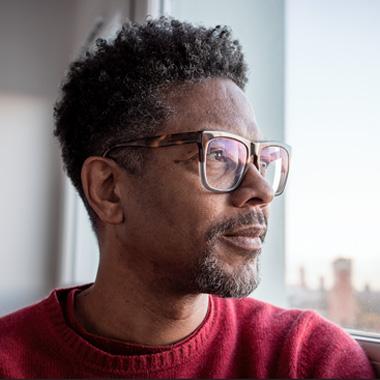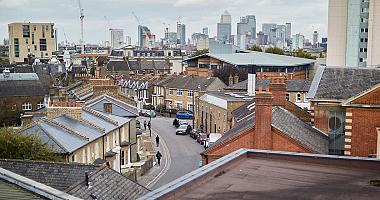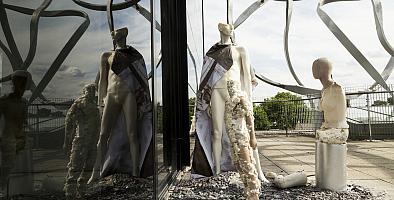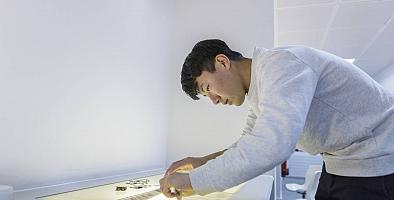MA
Photography & Urban Cultures
Content navigation menu
Why study MA Photography & Urban Cultures at Goldsmiths
Explore the creative interplay between urban theory and the visual representation of urban cultures and places.
- Developed by the Centre for Urban and Community Research, the degree encourages creative interplay between practice and theory – you’ll develop your practical photography skills and examine key ideas and debates in the representation and evocation of contemporary city life.
- You'll have the chance to consider cutting-edge debates in cultural and social theory in a research setting that actively encourages the development of photographic practice.
- If you are already a working photographer, visual artist or media practitioner, this programme gives you space to reflect critically on your practice.
- For those with a background in sociology, urban and cultural geography, cultural studies or anthropology, the degree provides an opportunity to combine visual forms of representation with standard forms of research techniques in investigating urban life and the physical environments of the city.
- The programme aims to link directly to professional research outcomes, and many graduates have secured employment within urban research, ethnography, teaching, curatorial and arts practice, human rights, and architectural research.
- You'll be joining our world-leading Department of Sociology. We've been rated top 10 in the UK for sociology by QS World University Rankings 2023.
Contact the department
If you have specific questions about the degree, contact Simon Rowe (Programme Convenor) or the Postgraduate Programmes Officer.
Length
1 year full-time or 2 years part-time
Fees
Home - full-time: £12520
Home - part-time: £6260
International - full-time: £22640
Department
What you'll study
You'll study the following compulsory modules:
| Module title | Credits |
|---|---|
| Talking Practice A | 30 credits |
| Cities and Society | 30 credits |
| Through the Lens | 30 credits |
| Talking Practice B | 30 credits |
How you'll be assessed
The assessment consists of coursework, extended essays, reports, presentations, practice-based projects or essays/logs, group projects, and reflective essays.
Suggested reading
Suggested preliminary reading:
Susan Sontag (1977), On Photography, Penguin
Sontag’s book is considered both controversial and insightful. She brings to the process of analysis a literary sensibility that doesn’t always sit easily with the practice of image-making. The essay In Plato’s Cave (chapter 1), is particularly relevant to a debate about the nature of photographic realism and visual epistemology.
Roland Barthes (1983), Camera Lucida: Reflections on Photography, Vintage
Barthes is best known for his extensive theoretical work around the nature of sign systems (semiotics), ideology and myth. In this beautifully written book, the author re-evaluates his relationship with photography through the autobiographical examination of a family photograph.
A. D. Coleman (1978), Depth of Field: Essays on Photography, Mass Media, and Lens Culture, University of New Mexico Press
Coleman’s essays touch on ethical debates around street photography (chapter 10), and what he terms ‘the destruction business’ of art criticism (chapter 1).
Graham Clarke (1997), The Photograph, Oxford University Press
Clarke’s book provides a useful overview of photography from a history of art/visual culture perspective. He covers a wide range of subjects including: what is a photograph? (chapter 1), how do we read photographs? (chapter 2), the city and portraiture (chapters 5 and 6), and the body (chapter 7). There is also a good discussion on the history and theory of documentary photography (chapter 8). This book is for the introductory reader.
Sarah Pink (2001), Doing Visual Ethnography, Sage
Pink’s book is a very good introduction to some of the key debates within visual sociology and anthropology. Her interdisciplinary book covers a wide range of theoretical and methodological issues, and it is recommended that you read the introduction and chapters 1 and 3 which focus on the relationship between ethnography and photography.
Les Back (2007), The Art of Listening, Berg
Back’s approach to visual image-making is based on listening to both photographers and those being photographed. Rather than taking a traditional art historical position of the informed, impartial and expert observer, Back is interested to learn about how photographers interact with their social environments, and how subjects negotiate and establish photographic agency. Chapter 4 (Listening with the Eye) provides a good discussion about an extended photographic encounter in London’s East End.
Caroline Knowles and Paul Sweetman (2004), Picturing the Social Landscape: Visual Methods and the Sociological Imagination, Routledge
This is a very accessible and relevant text that introduces key concepts around photography, visual methods and the sociological imagination. The introductory chapter by Knowles and afterword by Howard Becker focus on the methodological position of photography and its claim to evidentiality.
Gillian Rose (2012), Visual Methods: An Introduction to Researching with Visual Methods, Sage
Rose’s book focuses on a critical examination of how photography contributes towards researching societies and cultures. It is a useful introduction to research methods with discussions around photo-elicitation, aesthetics and ethics (chapters 4, 11 and 12). It is helpful to refer to this book in conjunction with Back, Knowles and Pink for a grounding in wider debates within ethnography and qualitative social science.
Careers
Graduates of the programme have progressed to the following areas and careers:
- Urban planning
- Curating
- Social research
- Architectural research
- Community arts education
- Journalism
- Public relations
- Advertising
- Doctoral studies
Skills
This MA develops skills in:
- Urban photography
- Visual ethnography and urban research
- Communications for urban planning
- Community arts and visual arts practice
Student work
Students and alumni from the Masters carry out exciting and thought-provoking work. One example is Gasket, a photographic collective formed of four Goldsmiths alumni. They have used their experiences on the programme to form a group, which has led to various exhibitions, events and workshops around the UK.
Entry requirements
You should have (or expect to be awarded) an undergraduate degree of at least upper second class standard in a relevant/related subject. You will also need to demonstrate proficiency in photographic practice, including familiarity with a 35mm camera and photographic printing.
You might also be considered for some programmes if you aren’t a graduate or your degree is in an unrelated field, but have relevant experience and can show that you have the ability to work at postgraduate level.
International qualifications
We accept a wide range of international qualifications. Find out more about the qualifications we accept from around the world.
If English isn’t your first language, you will need an IELTS score (or equivalent English language qualification) of 6.5 with a 6.5 in writing and no element lower than 6.0 to study this programme. If you need assistance with your English language, we offer a range of courses that can help prepare you for postgraduate study.
Fees and funding
Annual tuition fees
These are the PG fees for students starting their programme in the 2024/2025 academic year.
- Home - full-time: £12520
- Home - part-time: £6260
- International - full-time: £22640
If your fees are not listed here, please check our postgraduate fees guidance or contact the Fees Office, who can also advise you about how to pay your fees.
It’s not currently possible for international students to study part-time under a student visa. If you think you might be eligible to study part-time while being on another visa type, please contact our Admissions Team for more information.
If you are looking to pay your fees please see our guide to making a payment.
Funding opportunities
Explore the Goldsmiths scholarships finder to find out what funding you may be eligible for.
If you are a UK student you may be eligible for a postgraduate loan.
Meanwhile our Careers Service can also offer advice on finding work during your studies.
Paying your fees
Find out about paying your tuition fees.
Additional costs
In addition to your tuition fees, you'll be responsible for any additional costs associated with your course, such as buying stationery and paying for photocopying. You can find out more about what you need to budget for on our study costs page.
There may also be specific additional costs associated with your programme. This can include things like paying for field trips or specialist materials for your assignments. Please check the programme specification for more information.
Staff who contribute to the programme include:
Workshop tutors include:
How to apply
You apply directly to Goldsmiths using our online application system.
To complete your application, you will need to have:
- Details of your academic qualifications
- The email address of your referee who we can request a reference from, or alternatively a copy of your academic reference
- Copies of your educational transcripts or certificates
- A personal statement
- An edited portfolio of visual images (as a PowerPoint or PDF file of prints)
You'll be able to save your progress at any point and return to your application by logging in using your username/email and password.
When to apply
We accept applications from October for students wanting to start the following September.
We encourage you to complete your application as early as possible, even if you haven't finished your current programme of study. It's very common to be offered a place that is conditional on you achieving a particular qualification.
Late applications will only be considered if there are spaces available.
If you're applying for funding, you may be subject to an earlier application deadline.
Selection process
As part of the selction process, you may be offered an informal interview with the Programme Convenor.
Further guidance
Read our guide to applying for a postgraduate degree at Goldsmiths.






